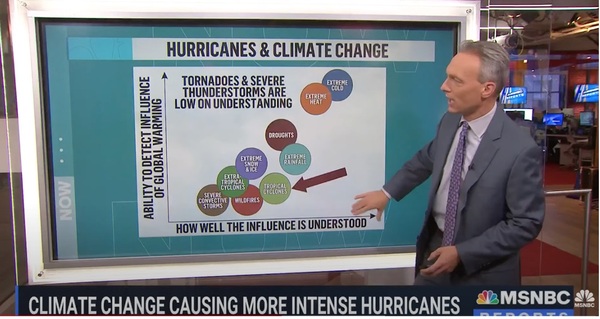
–>
October 10, 2022
Hurricane season is upon Southeastern America and that means hair-on-fire hysteria from the media and the political left. After Hurricane Ian ravaged southwest coastal Florida, we have heard nothing but hype from the corporate media, eager to connect every hurricane to catastrophic global warming, climate change, or whatever excuse they are currently using to usher in the Green New Deal and tyrannical top-down control of all aspects of our lives.
‘); googletag.cmd.push(function () { googletag.display(‘div-gpt-ad-1609268089992-0’); }); }
Hurricanes are not new and are a staple of southern coastal regions since long before Ron DeSantis was governor, Donald Trump owned Mar-a-Lago, or Americans burned fossil fuels to move them from place to place or heat and cool their homes. Yet judging from media histrionics, severe hurricanes are only a recent phenomenon, ignoring hundreds or thousands of years ago when Florida was nothing but a swamp.
Hurricane harpies in the media, practicing one of the Democrats’ favorite strategies of never letting a crisis go to waste, were quick to pounce on tragedy for political gain. Look at some of the headlines, all singing in perfect harmony.
From the Washington Post, “How climate change is rapidly fueling super hurricanes.” NPR proclaimed, “Climate change makes storms like Ian more common.” CBS News lamented, “How climate change is making storms like Hurricane Ian stronger more quickly.” Axios and President Biden say the science is settled, “Biden says events like Hurricane Ian end climate change debate.”

YouTube screen grab
‘); googletag.cmd.push(function () { googletag.display(‘div-gpt-ad-1609270365559-0’); }); }
On the Geophysical Fluid Dynamics Laboratory website, an overview of “global warming and hurricanes” by Tom Knutson, a senior scientist at NOAA and GFDL concluded,
In summary, it is premature to conclude with high confidence that human-caused increases in greenhouse gases have caused a change in past Atlantic basin hurricane activity that is outside the range of natural variability, although greenhouse gases are strongly linked to global warming.
In summary, neither our model projections for the 21st century nor our analyses of trends in Atlantic hurricane and tropical storm activity support the notion that greenhouse gas-induced warming leads to large increases in either tropical storm or overall hurricane numbers in the Atlantic.
In other words, there is scant evidence that hurricanes are either stronger or more frequent, and instead represent natural variability based on long existing cycles of ocean currents, solar activity, rainfall, and myriad other factors that influence weather. They also could not conclude that man-made global warming, assuming that such alleged warming too isn’t part of any of these cycles, is causing large increases in Atlantic storms and hurricanes.
I say “alleged warming” because NOAA data shows a gradual “global land and ocean” cooling trend from 2016 to present. How convenient that under “climate change”, the planet can either cool or warm without upsetting the political aspects of climate change.
The first recorded hurricane in Florida was in 1523, when Florida was a giant swamp. Were there hurricanes previously? Almost certainly but in those days and not until the past several decades did we have satellites and weather buoys to forecast and record early hurricanes far from the US, including those that hit the Caribbean Islands or blew out to sea. In the past, hurricanes were noted by ships in the area, meaning a severe hurricane could go undetected. Now satellites can detect a strong breeze over the South Atlantic.
‘); googletag.cmd.push(function () { googletag.display(‘div-gpt-ad-1609268078422-0’); }); } if (publir_show_ads) { document.write(“
The strongest hurricane in Florida was the “Labor Day” storm of 1935. Of the worst 15 recorded Florida hurricanes, more than half these storms did not have human names and occurred before 1950. Hurricane naming began in 1953. This was before SUVs, significant air travel, or the level of industrialization we see today. Strong storms are not a recent phenomenon and preceded “global cooling” of the 1970s and “global warming” of the past two decades. In other words, they are part of the Florida and Atlantic Ocean climate and have been so for centuries.
Although hurricanes are an autumn fixture in Florida, the state may also go through a hurricane drought, as Florida did for 11 years, between 2005 to 2016 where not a single hurricane came ashore. Was no one driving or firing up the backyard grill during those years? The activities which we are constantly told are destroying the planet continued during those years. We had both a Republican and Democrat president during the hurricane drought, in case the White House occupant is to be blamed or credited for the lack of hurricanes, and the media hurricane harpies offered no explanation as to this drought.
The reality is that weather and climate cannot be predicted with accuracy given our current knowledge. The Intergovernmental Panel on Climate Change agrees, “The climate system is a coupled non-linear chaotic system, and therefore the long-term prediction of future climate states is not possible.”
Damage however is worse due to recent hurricanes, even if the storms themselves are not as intense as a century ago. The Council on Foreign Relations scolds, “The US needs to prepare for more billion-dollar climate disasters like Hurricane Ian.”
The simple explanation is that there are more people and buildings in Florida than there were a century ago. A hundred years ago in 1922, the Florida population was 1,044.000. Today the population is almost 22 million, a more than 20-fold increase. With more people come more homes, high rise apartments and buildings, shopping malls, stores, and restaurants, all subject to expensive hurricane damage.
This photo on Twitter shows side by side photos of Miami Beach from 1925 and 2017, the former showing a few small buildings, the latter filled with high rise apartments and condos. Of course, a storm today will cause far more property damage compared to 100 years ago simply because there is now more property to destroy. Imagine 200 or 500 years ago when Florida was nothing but sand and swamp.
In those days, hurricanes were actually beneficial to the environment. The Weather Channel notes these positives – drought buster, anti-bacterial, heat balance, island rejuvenation, and Johnny Appleseed. Even far left Mother Jones in 2011 wrote, “Five good things about a hurricane.”
Joni Mitchell noted this phenomenon back in 1970 when she sang, “They paved paradise and put up a parking lot. With a pink hotel, a boutique, and a swinging hot spot.” Paradise welcomed hurricanes, the swinging hot spots don’t. This is why hurricanes now cause more property damage in Florida and along the Gulf Coast, not because the storms are stronger but because there is more property to damage.
Lastly is the inability to accurately predict hurricane paths days before the hurricane makes landfall. Hurricane Ian caught forecasters and the media off guard when shifting south in the final hours before making landfall. Yet Governor DeSantis was blamed for not evacuating the ultimate destination even though it was predicted further north. Did anyone expect the governor to evacuate the entire Gulf Coast of South Florida?
It’s interesting that “climate scientists” are quite certain about the weather 50 or 100 years in the future when then can’t predict a hurricane path days ahead. Both are predictions based on computer models of “non-linear chaotic systems” and if these models can’t see 5 days ahead, how can they see 5 decades into the future?
Common sense logic is lost on the left. Media cranks apparently never learned science or critical thinking during journalism school. This leave us with politicization of everything from COVID to the weather, and a steady dose of hurricane hysteria every Fall.
Brian C Joondeph, MD, is a physician and writer. Follow me on Twitter @retinaldoctor
Truth Social @BrianJoondeph
LinkedIn @Brian Joondeph
<!– if(page_width_onload <= 479) { document.write("
“); googletag.cmd.push(function() { googletag.display(‘div-gpt-ad-1345489840937-4’); }); } –> If you experience technical problems, please write to [email protected]
FOLLOW US ON
<!–
–>
<!– _qoptions={ qacct:”p-9bKF-NgTuSFM6″ }; ![]() –> <!—-> <!– var addthis_share = { email_template: “new_template” } –>
–> <!—-> <!– var addthis_share = { email_template: “new_template” } –>





